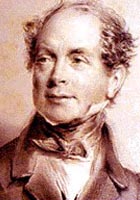Lalla Rookh Poem by Thomas Moore
Lalla Rookh
"How sweetly," said the trembling maid,
Of her own gentle voice afraid,
So long had they in silence stood,
Looking upon that tranquil flood--
"How sweetly does the moon-beam smile
To-night upon yon leafy isle!
Oft in my fancy's wanderings,
I've wish'd that little isle had wings,
And we, within its fairy bow'rs,
Were wafted off to seas unknown,
Where not a pulse should beat but ours,
And we might live, love, die alone!
Far from the cruel and the cold,--
Where the bright eyes of angels only
Should come around us, to behold
A paradise so pure and lonely.
Would this be world enough for thee?"--
Playful she turn'd, that he might see
The passing smile her cheek put on;
But when she mark'd how mournfully
His eyes met hers, that smile was gone;
And, bursting into heart-felt tears,
"Yes, yes," she cried, "my hourly fears
My dreams have boded all too right--
We part--for ever part--to-night!
I knew, I knew it could not last--
'Twas bright, 'twas heav'nly, but 'tis past!
Oh! ever thus, from childhood's hour,
I've seen my fondest hopes decay;
I never lov'd a tree or flow'r,
But 'twas the first to fade away.
I never nurs'd a dear gazelle
To glad me with its soft black eye,
But when it came to know me well
And love me, it was sure to die!
Now too--the joy most like divine
Of all I ever dreamt or knew,
To see thee, hear thee, call thee mine,--
Oh misery! must I lose that too?
Yet go--on peril's brink we meet;--
Those frightful rocks--that treach'rous sea--
No, never come again--though sweet,
Though heav'n, it may be death to thee.
Farewell--and blessings on thy way,
Where'er thou goest, beloved stranger!
Better to sit and watch that ray,
And think thee safe, though far away,
Than have thee near me, and in danger!"
This poem has not been translated into any other language yet.
I would like to translate this poem
I found this poem by chance. Reading George Eliot's Middlemarch the author refers to this poem as Rosamond Vincy's favourite. So I decided to find it. The poem is a wonderful example of true love. The representation of this powerful emotion reminds me of Solomon's brilliant verdict concerning the two women who are quarrelling over a child. The real mother gives up keeping her most beloved one, so that she can save its life. The poem is about a true lover who is able to keep her lover by resigning of him. We feel how time can deprive a person of all his/her treasures, and having something is just a mere illusion, because sooner or later the treasures become just a memory. The poem proves how strong some people can be, they enjoy the moment while they know that it will vanish for ever. Martin Buber, the great philosopher deals with great encounters when two persons influence each other for the rest of their lives, he emphasizes that the encounters we miss, can be just as important as the real ones. The poem is a great proof that letting love go doesn't really mean losing it, just the opposite. Great souls are able to resign, and keep their emotion forever. Unfortunately in George Eliot's Middlemarch the heroine who loves this poem is not able to find this kind of love. She ruins the man whom she marries. I am glad to find this poem. It was a great encounter for me. Hegedus Katalin from Hungary